人教版高二英语必修5 Unit 1 Great Scientists Grammar 过去分词作定语和表语课件(共29张ppt)
文档属性
| 名称 | 人教版高二英语必修5 Unit 1 Great Scientists Grammar 过去分词作定语和表语课件(共29张ppt) | 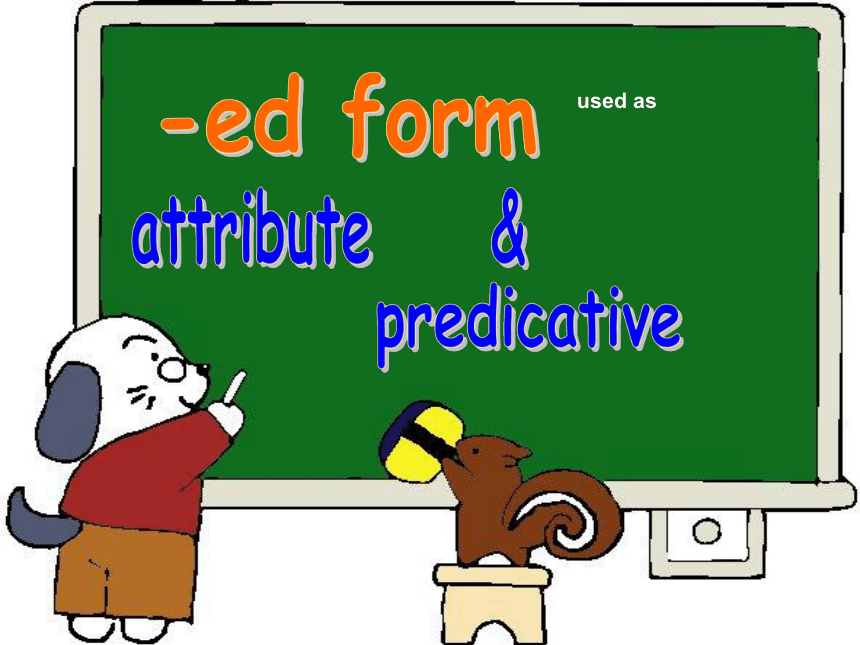 | |
| 格式 | ppt | ||
| 文件大小 | 770.0KB | ||
| 资源类型 | 教案 | ||
| 版本资源 | 人教版(新课程标准) | ||
| 科目 | 英语 | ||
| 更新时间 | 2020-09-19 19:45:37 | ||
图片预览

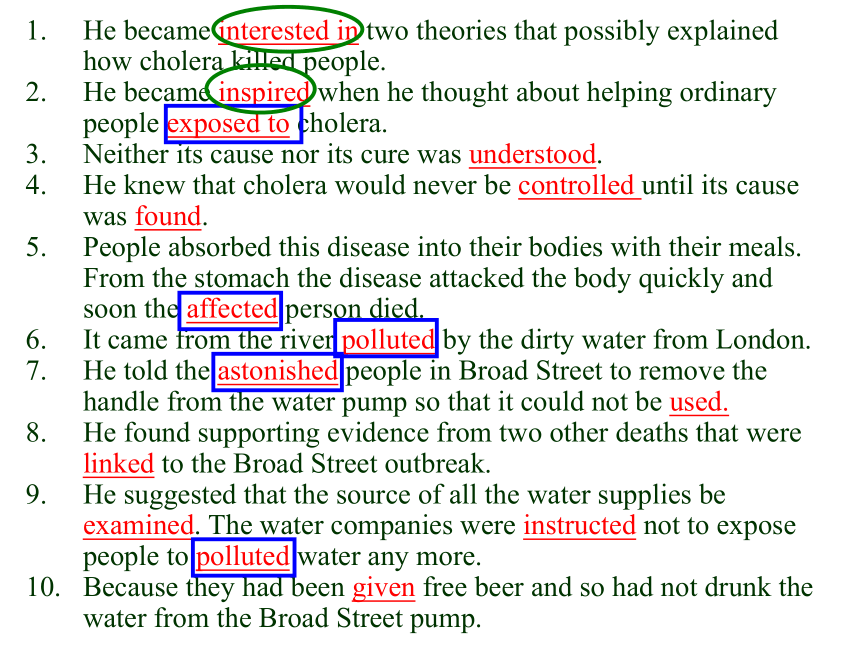
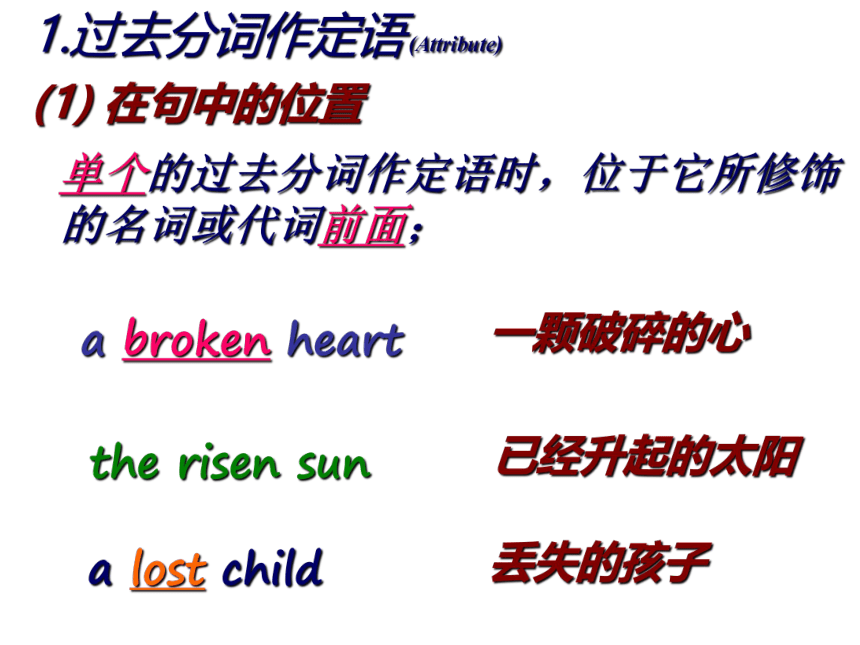
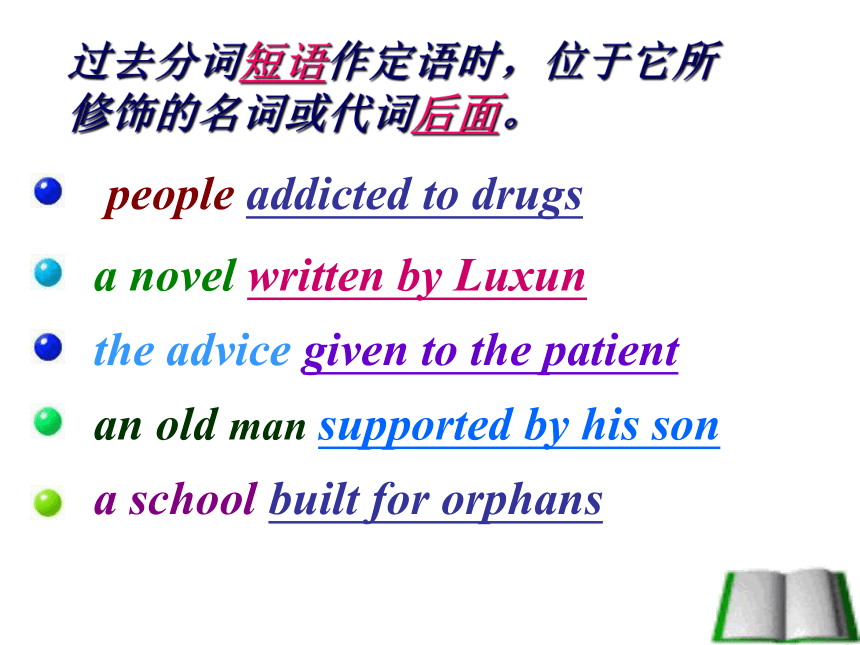
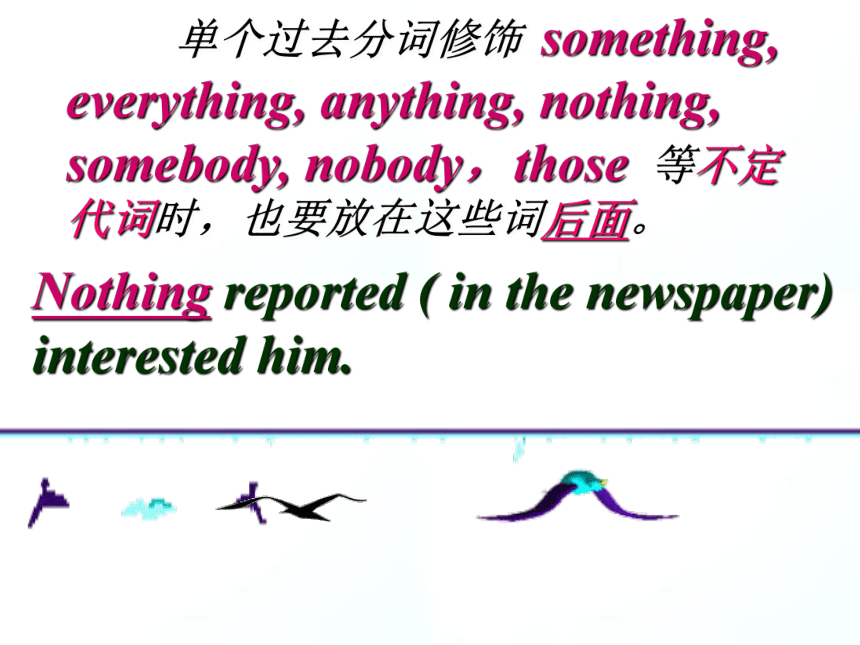
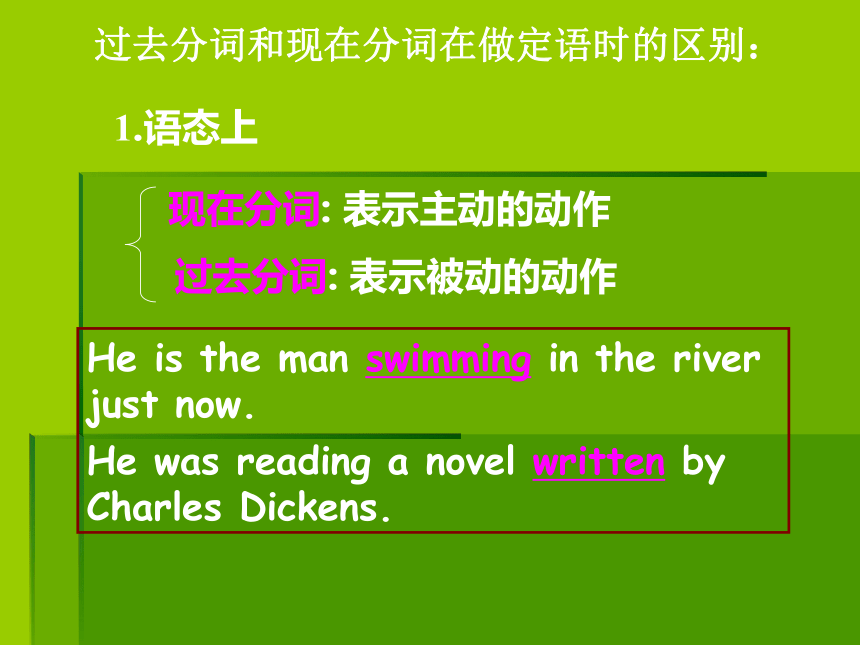
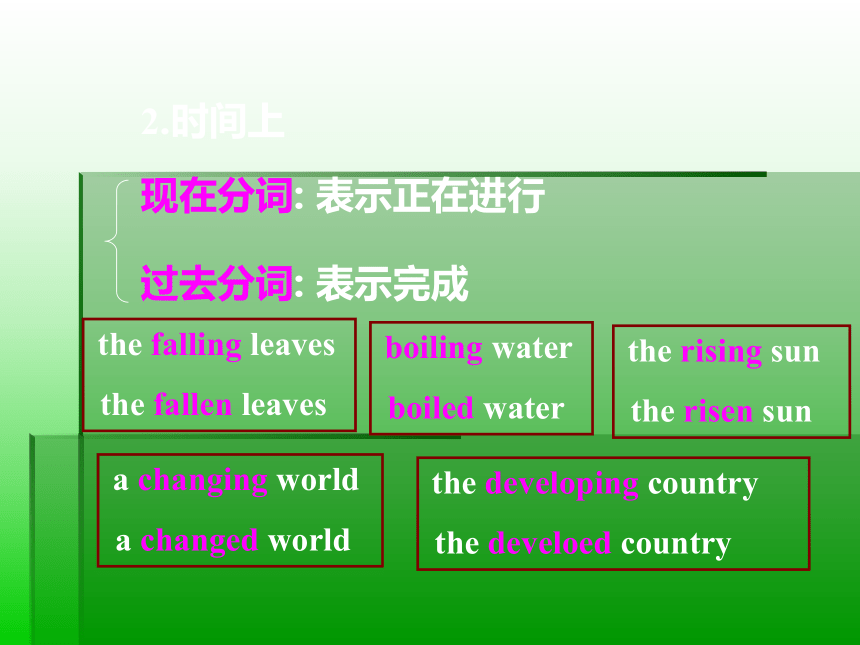
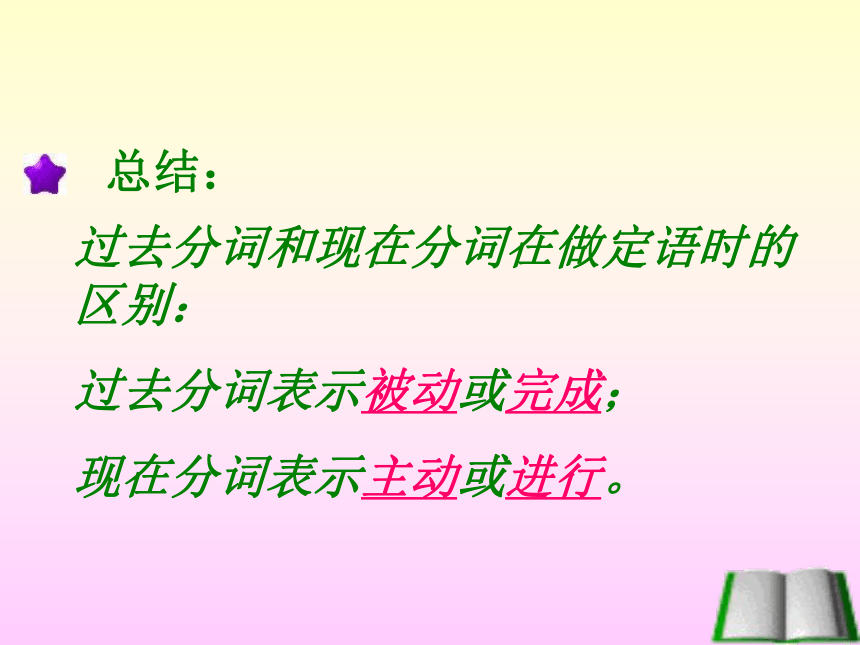
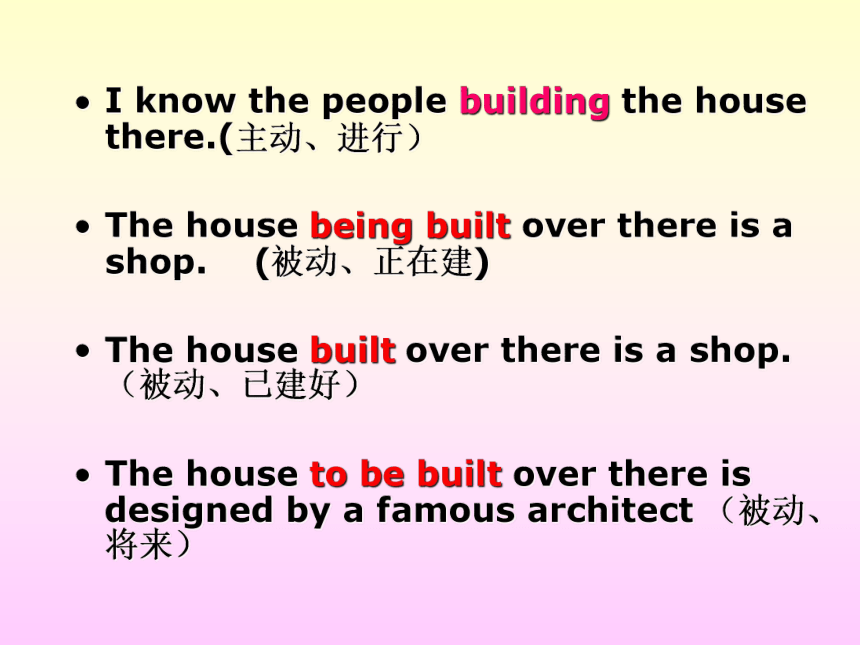
文档简介
used as
He became interested in two theories that possibly explained how cholera killed people.
He became inspired when he thought about helping ordinary people exposed to cholera.
Neither its cause nor its cure was understood.
He knew that cholera would never be controlled until its cause was found.
People absorbed this disease into their bodies with their meals. From the stomach the disease attacked the body quickly and soon the affected person died.
It came from the river polluted by the dirty water from London.
He told the astonished people in Broad Street to remove the handle from the water pump so that it could not be used.
He found supporting evidence from two other deaths that were linked to the Broad Street outbreak.
He suggested that the source of all the water supplies be examined. The water companies were instructed not to expose people to polluted water any more.
Because they had been given free beer and so had not drunk the water from the Broad Street pump.
1.过去分词作定语 (Attribute)
一颗破碎的心
丢失的孩子
已经升起的太阳
(1) 在句中的位置
单个的过去分词作定语时,位于它所修饰的名词或代词前面;
a broken heart
the risen sun
a lost child
people addicted to drugs
a novel written by Luxun
the advice given to the patient
an old man supported by his son
a school built for orphans
过去分词短语作定语时,位于它所修饰的名词或代词后面。
单个过去分词修饰 something, everything, anything, nothing, somebody, nobody,those 等不定代词时,也要放在这些词后面。
Nothing reported ( in the newspaper) interested him.
1.语态上
现在分词: 表示主动的动作
过去分词: 表示被动的动作
He is the man swimming in the river just now.
He was reading a novel written by Charles Dickens.
过去分词和现在分词在做定语时的区别:
2.时间上
现在分词: 表示正在进行
过去分词: 表示完成
the rising sun
the risen sun
the falling leaves
the fallen leaves
boiling water
boiled water
a changing world
a changed world
the developing country
the develoed country
过去分词和现在分词在做定语时的区别:
过去分词表示被动或完成;
现在分词表示主动或进行。
总结:
I know the people building the house there.(主动、进行)
The house being built over there is a shop. (被动、正在建)
The house built over there is a shop. (被动、已建好)
The house to be built over there is designed by a famous architect (被动、将来)
His book ____________ last year sells well.
His book _____________ now will be on sale next year.
His book _____________ next year will be his best one.
The press(出版社) ___________ his book is famous in the city.
published
being published
to be published
publishing
publish
过去分词和V-ing形式作表语的区别:
表特征---含有“令人……”之意
表状态---含有“感到……”之意
V-ing形式
过去分词
比较: The film is interesting.
I'm interested in English.
surprising ~surprised exciting ~excited
disappointing ~disappointed tiring ~tired
amazing ~ amazed boring ~ bored
relaxing ~ relaxed pleasing ~pleased
confusing ~confused satisfying ~satisfied
astonishing ~astonished inspiring ~ inspired
amusing ~amused entertaining ~entertained
depressing ~ depressed
Fill in the blank with the –ing or the –ed form of the verb.
We were ______ by his ______ behavior. (astonish)
I was also ______ when I was asked such a ______ question. (confuse)
The student was finally ______ by the teacher giving her the ______ answer. (convince)
I am really ______ in your ______ talk. (interest)
He is a ______ teacher, and I feel ______ on his class. (bore)
astonished
astonishing
confused
confusing
convinced
convincing
interested
interesting
bored
boring
过去分词作表语一般用来表示感受或状态(系动词+过去分词)
No wonder he is excited! (predictive)
可以用作表语的常见的过去分词有:
delighted, disappointed, upset,
astonished, excited, frightened,
experienced, interested, qualified,
puzzled, exhausted, satisfied
…helping ordinary people exposed to cholera
宾语
名词
?
So many thousands of terrified people died
名词
形容词
?
过去分词作定语:
1. 分词可以用作前置定语,此时,分词和名词之间有两种语意关系:一种是分词表示时间上已经过去;一种是分词表被动。
He is a retired worker.
他是一个退休工人。
This is a newly-developed device.
这是一个新开发的工具。
2. 过去分词作后置定语时,其功能当于一个定语从句。
Let’s try the bookstore that was opened last month.
名词
定语从句
Let’s try the bookstore opened last month.
过去分词
名词
2. 过去分词作后置定语时,其功能当于一个定语从句。
How can you change a past participle into an attributive clause
But he became inspired when he thought about helping ordinary people exposed to cholera
So many thousands of terrified people died every time there was an outbreak.
Nine out of ten women who were interviewed about the product said they liked it.
Nine out of ten women interviewed about the product said they liked it.
He found that it came from the river polluted by the dirty water from London.
He found that it came from the river which was polluted by the dirty water from London.
From the stomach the disease quickly attacked the body and soon the person who was affected by the disease died.
From the stomach the disease quickly attacked the body and soon the affected person died.
He immediately told the people who were astonished by the disease in Bread Street to remove the handle…
He immediately told the astonished people in Bread Street to remove the handle…
Rewrite these sentences as one sentence using the past participle as the attribute or predicative.
2
1. I found this plate on the floor. The
plate was broken in pieces.
I found this broken plate on the floor.
2. I saw a tall, dark and handsome man.
His name is Xiao Ming.
I saw a tall, dark and handsome man
called Xiao Ming.
3. I looked at that modem abstract (抽象)
painting. It was colored in yellows and
greens.
I looked at that modem abstract painting
colored in yellows and greens.
4. Yesterday I got the answer to my
question on the internet. It was the one I expected.
Yesterday I got the expected answer to
my question on the internet.
5. She is one of my friends. She is devoted
to my interests.
She is my friend devoted to my
interests.
6. On the doorstep I found a lot of bottles.
They were marked in green ink.
On the doorstep I found a lot of bottles
labelled in green ink.
7. We saw many windows in that room.
They were all cracked.
We saw many cracked windows in
that room.
Compare –ing and –ed
His words were very frightening.
We are frightened at his words.
The picture hanging on the wall was painted by my cousin.
Many things considered impossible in the past are quite common today.
主语
现在分词
主语
过去分词
主动
被动
主动
被动
下列各句均有一处错误,请指出并改正。
1. The speech that we listened to yesterday afternoon was very moved .
2. From the disappointing look on his face, we know that he didn’t pass the exam.
3. That must have been a terrified experience.
4. Some foreign press reports are quite confused.
moving
disappointed
terrifying
confusing
He became interested in two theories that possibly explained how cholera killed people.
He became inspired when he thought about helping ordinary people exposed to cholera.
Neither its cause nor its cure was understood.
He knew that cholera would never be controlled until its cause was found.
People absorbed this disease into their bodies with their meals. From the stomach the disease attacked the body quickly and soon the affected person died.
It came from the river polluted by the dirty water from London.
He told the astonished people in Broad Street to remove the handle from the water pump so that it could not be used.
He found supporting evidence from two other deaths that were linked to the Broad Street outbreak.
He suggested that the source of all the water supplies be examined. The water companies were instructed not to expose people to polluted water any more.
Because they had been given free beer and so had not drunk the water from the Broad Street pump.
1.过去分词作定语 (Attribute)
一颗破碎的心
丢失的孩子
已经升起的太阳
(1) 在句中的位置
单个的过去分词作定语时,位于它所修饰的名词或代词前面;
a broken heart
the risen sun
a lost child
people addicted to drugs
a novel written by Luxun
the advice given to the patient
an old man supported by his son
a school built for orphans
过去分词短语作定语时,位于它所修饰的名词或代词后面。
单个过去分词修饰 something, everything, anything, nothing, somebody, nobody,those 等不定代词时,也要放在这些词后面。
Nothing reported ( in the newspaper) interested him.
1.语态上
现在分词: 表示主动的动作
过去分词: 表示被动的动作
He is the man swimming in the river just now.
He was reading a novel written by Charles Dickens.
过去分词和现在分词在做定语时的区别:
2.时间上
现在分词: 表示正在进行
过去分词: 表示完成
the rising sun
the risen sun
the falling leaves
the fallen leaves
boiling water
boiled water
a changing world
a changed world
the developing country
the develoed country
过去分词和现在分词在做定语时的区别:
过去分词表示被动或完成;
现在分词表示主动或进行。
总结:
I know the people building the house there.(主动、进行)
The house being built over there is a shop. (被动、正在建)
The house built over there is a shop. (被动、已建好)
The house to be built over there is designed by a famous architect (被动、将来)
His book ____________ last year sells well.
His book _____________ now will be on sale next year.
His book _____________ next year will be his best one.
The press(出版社) ___________ his book is famous in the city.
published
being published
to be published
publishing
publish
过去分词和V-ing形式作表语的区别:
表特征---含有“令人……”之意
表状态---含有“感到……”之意
V-ing形式
过去分词
比较: The film is interesting.
I'm interested in English.
surprising ~surprised exciting ~excited
disappointing ~disappointed tiring ~tired
amazing ~ amazed boring ~ bored
relaxing ~ relaxed pleasing ~pleased
confusing ~confused satisfying ~satisfied
astonishing ~astonished inspiring ~ inspired
amusing ~amused entertaining ~entertained
depressing ~ depressed
Fill in the blank with the –ing or the –ed form of the verb.
We were ______ by his ______ behavior. (astonish)
I was also ______ when I was asked such a ______ question. (confuse)
The student was finally ______ by the teacher giving her the ______ answer. (convince)
I am really ______ in your ______ talk. (interest)
He is a ______ teacher, and I feel ______ on his class. (bore)
astonished
astonishing
confused
confusing
convinced
convincing
interested
interesting
bored
boring
过去分词作表语一般用来表示感受或状态(系动词+过去分词)
No wonder he is excited! (predictive)
可以用作表语的常见的过去分词有:
delighted, disappointed, upset,
astonished, excited, frightened,
experienced, interested, qualified,
puzzled, exhausted, satisfied
…helping ordinary people exposed to cholera
宾语
名词
?
So many thousands of terrified people died
名词
形容词
?
过去分词作定语:
1. 分词可以用作前置定语,此时,分词和名词之间有两种语意关系:一种是分词表示时间上已经过去;一种是分词表被动。
He is a retired worker.
他是一个退休工人。
This is a newly-developed device.
这是一个新开发的工具。
2. 过去分词作后置定语时,其功能当于一个定语从句。
Let’s try the bookstore that was opened last month.
名词
定语从句
Let’s try the bookstore opened last month.
过去分词
名词
2. 过去分词作后置定语时,其功能当于一个定语从句。
How can you change a past participle into an attributive clause
But he became inspired when he thought about helping ordinary people exposed to cholera
So many thousands of terrified people died every time there was an outbreak.
Nine out of ten women who were interviewed about the product said they liked it.
Nine out of ten women interviewed about the product said they liked it.
He found that it came from the river polluted by the dirty water from London.
He found that it came from the river which was polluted by the dirty water from London.
From the stomach the disease quickly attacked the body and soon the person who was affected by the disease died.
From the stomach the disease quickly attacked the body and soon the affected person died.
He immediately told the people who were astonished by the disease in Bread Street to remove the handle…
He immediately told the astonished people in Bread Street to remove the handle…
Rewrite these sentences as one sentence using the past participle as the attribute or predicative.
2
1. I found this plate on the floor. The
plate was broken in pieces.
I found this broken plate on the floor.
2. I saw a tall, dark and handsome man.
His name is Xiao Ming.
I saw a tall, dark and handsome man
called Xiao Ming.
3. I looked at that modem abstract (抽象)
painting. It was colored in yellows and
greens.
I looked at that modem abstract painting
colored in yellows and greens.
4. Yesterday I got the answer to my
question on the internet. It was the one I expected.
Yesterday I got the expected answer to
my question on the internet.
5. She is one of my friends. She is devoted
to my interests.
She is my friend devoted to my
interests.
6. On the doorstep I found a lot of bottles.
They were marked in green ink.
On the doorstep I found a lot of bottles
labelled in green ink.
7. We saw many windows in that room.
They were all cracked.
We saw many cracked windows in
that room.
Compare –ing and –ed
His words were very frightening.
We are frightened at his words.
The picture hanging on the wall was painted by my cousin.
Many things considered impossible in the past are quite common today.
主语
现在分词
主语
过去分词
主动
被动
主动
被动
下列各句均有一处错误,请指出并改正。
1. The speech that we listened to yesterday afternoon was very moved .
2. From the disappointing look on his face, we know that he didn’t pass the exam.
3. That must have been a terrified experience.
4. Some foreign press reports are quite confused.
moving
disappointed
terrifying
confusing
